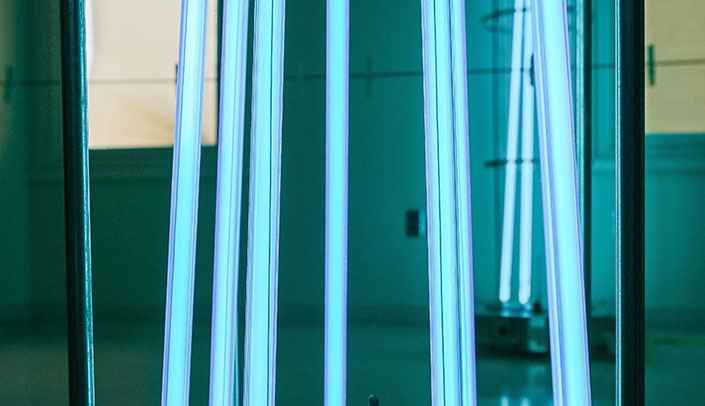Drawing on funds provided by the Nebraska Legislature, infectious disease experts at the UNMC Global Center for Health Security — in consultation with Nebraska’s six regional health care coalitions — have distributed UV light machines to six locations across the state to combat a shortage of one-use personal protective equipment (PPE) N95 respirators.
The state funding for this project was part of $3.5 million directed to UNMC as part of the emergency funding package to support the state’s COVID-19 efforts. Other funding went toward equipment, supplies and personnel that support testing in Omaha and throughout the state.
Earlier this spring, UNMC/Nebraska Medicine developed a safe and effective method to use ultraviolet light to decontaminate N95 respirators so they could be used more than once, addressing a dangerous shortage in the vital equipment. UNMC/Nebraska Medicine experts trained personnel throughout the state on the decontamination process, as well as distribution of the UV light machines.
“Each of the coalition coordinators in each region worked with their stakeholders to identify the locations,” said Shelly Schwedhelm, executive director of emergency management and biopreparedness at Nebraska Medicine and an executive director at the Global Center for Health Security at UNMC. “In many cases, the selection was a health care facility; in one location, it was a department of transportation location.”
The resources serve not only health care facilities, but emergency medical services, long-term care facilities and others, Schwedhelm said. “There are a lot of different end-user groups that are impacted by the shortage of N95 respirators and are using this process.”
The UV Machines and Process have been set up at:
- The City of Lincoln Department of Transportation and Utilities;
- Regional West Medical Center, Scottsbluff;
- Avera St. Anthony’s Hospital, O’Neill;
- CHI Good Samaritan Hospital, Kearney;
- OrthoNebraska Hospital, Omaha;
- Chase County Community Hospital, Imperial.
John Lowe, Ph.D., UNMC assistant vice chancellor for interprofessional health security training and education, led the team that developed the method to decontaminate N95 respirators so they can be disinfected between uses.
The decontamination method is now in operation at all locations, Schwedhelm said.
